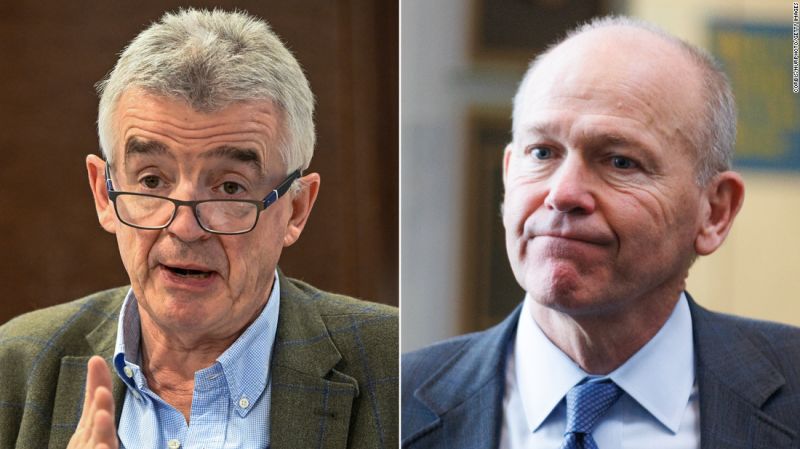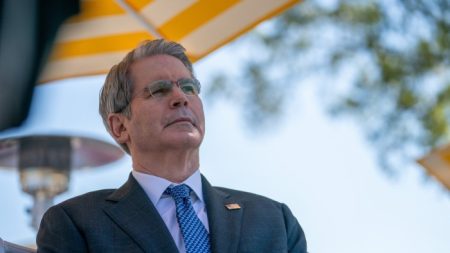The CEO of Europe’s largest airline, who not so long ago described Boeing management as “headless chickens,” has come out in strong support of the beleaguered US planemaker, pushing back against criticism from several other carriers after this month’s mid-flight breakage on a Boeing aircraft.
“I have a lot of confidence both personally and professionally in David Calhoun and in Brian West,” Ryanair’s Michael O’Leary said Monday, referring to Boeing’s CEO and chief financial officer respectively.
“I know they are under attack from certain quarters. They are doing a good job, they are turning that company around. I think safety is their number one byword,” he commented in a video posted on Ryanair’s website to coincide with its third-quarter earnings.
Ryanair, which also owns Polish airline Buzz and Austrian carrier Lauda, is one of Boeing’s biggest customers and the planemaker’s performance is crucial to the budget carrier’s success — as evidenced by the way repeated delays in the delivery of Boeing aircraft have hampered Ryanair’s growth.
Still, O’Leary’s comments stand in sharp contrast to his previous scathing criticism of Boeing’s top brass. In May 2022, he said the company’s executives needed either an immediate “reboot, or a boot up the a**.”
His backing also represents a rare show of support for Boeing, which has come under fire from several of its other airline customers — including Alaska, American and United — after a part of a Boeing 737 Max 9 aircraft shot out from the side of the fuselage only a few minutes into an Alaska Airlines flight, forcing the pilot to make an emergency landing.
Calhoun — who was appointed to the top job in January 2020 as Boeing was already struggling with quality and safety issues — will unveil the planemaker’s full-year results Wednesday. Like his predecessor Dennis Muilenberg, Calhoun is facing close scrutiny from customers, regulators and investors. Shareholders are nursing heavy losses, with Boeing’s stock down around 17% since the incident on January 5.
The blowout has also raised questions about whether Boeing will be able to secure orders for its newer, larger Max 10 aircraft, which has yet to be approved for service by the US Federal Aviation Administration.
In an interview with CNBC last week, United Airlines CEO Scott Kirby said the airline was “going to build a plan that doesn’t have the Max 10 in it.” And Reuters reported Sunday that Kirby recently flew to the French city of Toulouse to discuss a potential deal to buy planes from Boeing’s archrival Airbus.
Ryanair, for its part, remains committed to the Max 10, having inked a $40 billion deal last year to buy up to 300 of the aircraft.
“The Max 10 order is vital to Ryanair’s growth,” O’Leary said Monday. “And if United or any other airline don’t want to take their Max 10 orders, we’ll be happy to step in…and take some of our Max 10 deliveries earlier.”
“Boeing are still making great aircraft, but they do have to improve quality control and the quality of what they’re delivering to their airline customers,” he added, saying on an earnings call later that Ryanair was putting more of its own engineers in factories that build Boeing planes to run extra checks.
O’Leary said Ryanair’s growth had been “held back slightly” by Boeing’s delivery delays, leading the airline to lower its traffic forecast for the year ending in March 2024 from 185 million passengers to 183.5 million passengers.
Meanwhile, disputes with online travel agencies — which O’Leary described as “pirates” — saw Ryanair’s flights removed from their websites in early December, forcing the airline to cut fares to fill unsold seats in the October-to-December quarter.
Partly because of this, Ryanair expects full-year profit for the current financial year to be at the lower end of a range of €1.85 billion-€1.95 billion ($2 billion-$2.1 billion) — trimming a November forecast of up to €2.05 billion ($2.2 billion).
That would still be up from its previous record of €1.45 billion ($1.6 billion) earned in 2018, before the Covid-19 pandemic.
Ryanair has since struck deals with Love Holidays in the United Kingdom and Kiwi.com in Europe, and is in talks with other travel agencies, which will see users book flights directly on its website.
Read the full article here















